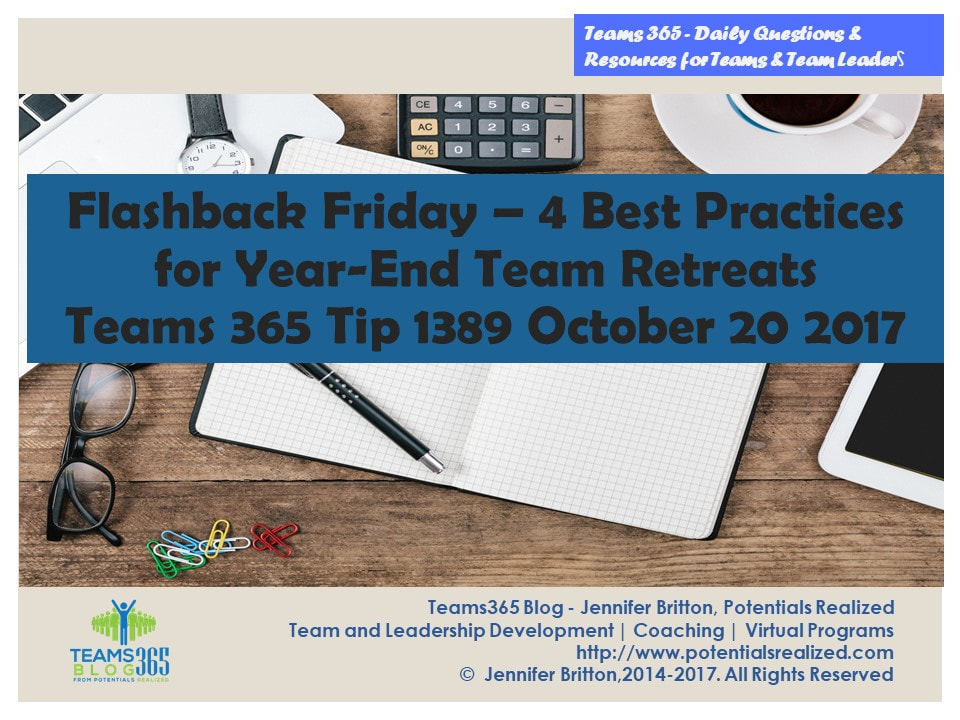I am starting to receive a number of emails and phone calls from teams who are looking to organize their year end functions. It's only about 70 days until the end of the year. What are you as a team hoping to complete before 2017 winds down? How will you be preparing for your best year yet in 2018?
I wanted to bring forward a post that I wrote late last year which was posted on LinkedIn Pulse. It's entitled "4 Best Practices for Year-End Team Retreats" and is geared to anyone who is starting to think about what your year-end retreat can look like. I hope that you find this useful as our FlashbackFriday this week. Here's what I wrote in that LinkedIn post:
"It’s that time of year for parties, year-end team retreats and other events. Are you maximizing the amount of time and impact of these team events?
Having supported year-end programming for teams and organizations for many years I thought it would be useful to share four focus areas you may want to consider as you start preparing, planning and perhaps facilitating your year-end processes.
Number One — What’s the purpose? If you had to distill down the top two or three takeaways from the retreat process or that off site, what is it? The purpose of our year-end function can impact the structure and activities undertaken in the program.
Is the purpose of your year-end event:
- to build connection?
- to share important information?
- do some goal planning?
- to build understanding across the silos, that may exist within your organization?
Number Two — What is the connection to the business? Think about what is the connection to the business. It’s still very common in today’s world for people to just go through the motions of a traditional annual year end party and /or event.
Are you really maximizing that investment of bringing people together?
Could you build into that luncheon a half-day session before or after, to do some work with your staff teams to support their development, to help them look at their skills and strengths and styles and also to share with them, you know, and help them connect to the link with your business.
What opportunities do you have already formalized for bringing people together at year-end? What changes or additions do you want to make?
Number Three — Do you want to do it all alone? Many organizations today have a committee and amongst that committee membership, there may be some members who would be very comfortable in facilitating your year-end team or organizational process.
So, think about who might be best equipped to do the work? Is it you, members of that committee or maybe you are interested in bringing in an external facilitator?
One of the things we do, is either we come in and facilitate or develop activities which you can facilitate yourself.
Think about how you might be able to leverage the resources you have and or bring in some special guest speakers or external resources to contribute to the environment that you want to create.
Number Four — How are you going to take this forward?One of the biggest challenges that we see in learning and development today is this continued lack of transferability to the work place.
This was what drew me to focus more on the area of Coaching which places an ongoing emphasis on accountability and transferability to the workplace.
One the things I like to encourage organizations that I partner with to always thinking about is – How will you sustain the conversation? How will you take this forward into your work?
Hopefully any year-end retreat process or year-end meeting will have an action step and a very formalized action planning stage. Remember to build in time in the new year to revisit your commitments and accountabilities.
Here’s a quick recap:
Number One - Think about the purpose. What are the top three or four reasons or things that you want people to take away?
Number Two - What’s the link of the year-end program to the business? Is it just to have fun or something else?
Number Three - As your approaching your year-end processes, is this something you want to do or do you want to bring in a facilitator? A third option perhaps is to have something designed for you, so you can facilitate it yourself.
And finally, Number Four. What are the takeaways? How will people sustain the conversation? When will you check in on your actions and commitments?
I hope that you’re finding these ideas valuable, practical, and of course, implementable."
Have a great weekend,
Jennifer
Potentials Realized | Coaching Team Leaders
Team and Leadership Development | Coaching | Retreats.
Follow us on Twitter @Teams365
Phone: (416)996-8326
Looking to enhance your virtual conversations - Conference calls? Webinars? Virtual coaching work? Pick up a copy of my new book, Effective Virtual Conversations, at Amazon. You can also purchase a copy direct from our site, signed by me!

 RSS Feed
RSS Feed





